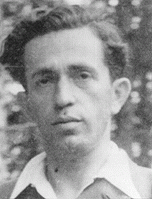You searched for: %E8%99%9B%E6%93%AC%E8%B2%A8%E5%B9%A3%E7%A8%8B%E5%BA%8F%E6%90%AD%E5%BB%BA%E3%80%90TG%EF%BF%BD%EF%BF%BD%EF%BF%BD%EF%BF%BD%EF%BF%BD%EF%BF%BD%EF%BF%BD%EF%BF%BD%EF%BF%BD%40EK7676%E3%80%91%E5%B9%B3%E5%8F%B0%E5%8C%85%E7%BD%91%E6%90%AD%E5%BB%BA%E8%99%9B%E6%93%AC%E8%B2%A8%E5%B9%A3%E7%A8%8B%E5%BA%8F%E6%90%AD%E5%BB%BA%E3%80%90TG%EF%BF%BD%EF%BF%BD%EF%BF%BD%EF%BF%BD%EF%BF%BD%EF%BF%BD%EF%BF%BD%EF%BF%BD%EF%BF%BD%40EK7676%E3%80%91%E5%B9%B3%E5%8F%B0%E5%8C%85%E7%BD%91%E6%90%AD%E5%BB%BASRQE6tUVSg
<< Previous | Displaying results 111-120 of 192 for "%E8%99%9B%E6%93%AC%E8%B2%A8%E5%B9%A3%E7%A8%8B%E5%BA%8F%E6%90%AD%E5%BB%BA%E3%80%90TG%EF%BF%BD%EF%BF%BD%EF%BF%BD%EF%BF%BD%EF%BF%BD%EF%BF%BD%EF%BF%BD%EF%BF%BD%EF%BF%BD%40EK7676%E3%80%91%E5%B9%B3%E5%8F%B0%E5%8C%85%E7%BD%91%E6%90%AD%E5%BB%BA%E8%99%9B%E6%93%AC%E8%B2%A8%E5%B9%A3%E7%A8%8B%E5%BA%8F%E6%90%AD%E5%BB%BA%E3%80%90TG%EF%BF%BD%EF%BF%BD%EF%BF%BD%EF%BF%BD%EF%BF%BD%EF%BF%BD%EF%BF%BD%EF%BF%BD%EF%BF%BD%40EK7676%E3%80%91%E5%B9%B3%E5%8F%B0%E5%8C%85%E7%BD%91%E6%90%AD%E5%BB%BASRQE6tUVSg" | Next >>
-
Jeno Nemeth
ID CardJeno moved to Szentes from a tiny farming community near the city of Szolnok, where he and his two brothers had been born to Jewish parents. Jeno owned a store that carried groceries and hardware items. He lived in the southeast Hungarian town of Szentes. Jeno and his wife, Juliana, had two married daughters, Barbara and Margit. Their son, Desider, was a dentist in Szentes. 1933-39: Jeno and his wife work hard in their store. The Depression of the 1930s was devastating, but things are starting to get a…
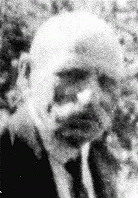
-
Ravensbrück
ArticleLearn about conditions and the treatment of prisoners in Ravensbrück, the largest concentration camp for women in the German Reich.
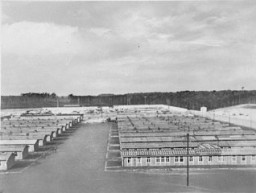
-
Collaboration
ArticleTo perpetrate the Holocaust, Nazi Germany relied on the help of allies and collaborators from across Europe, including governments, institutions, and individuals.
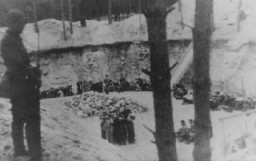
-
Subcarpathian Rus (Ukraine)
ArticleLearn more about the Transcarpathian region of Ukraine (Subcarpathian Rus) before and during World War II.
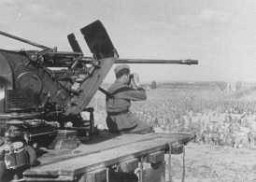
-
Hidden Children: Hardships
ArticleParents, children, and rescuers faced daunting challenges once the decision was made for a child to go into hiding during the Holocaust.
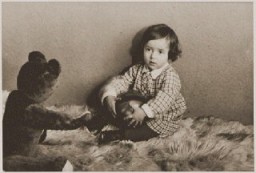
-
Klaus Barbie: The Butcher of Lyon
ArticleKlaus Barbie, chief of the Gestapo in Lyon, France, was nicknamed the "Butcher of Lyon" for his brutal actions towards Jews and members of the French Resistance.
-
The Immigration of Refugee Children to the United States
ArticleMore than one thousand unaccompanied refugee children fleeing Nazi persecution arrived in the United States between 1933 and 1945. Learn more
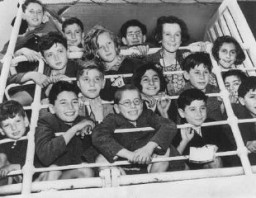
-
The Enabling Act
ArticleThe Enabling Act of March 1933 allowed the Reich government to issue laws without the consent of Germany’s parliament. It laid the foundation for the Nazification of German society.
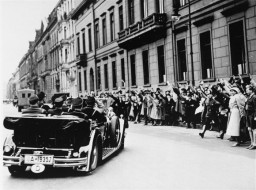
-
Dismissal letter from the Berlin transit authority
DocumentA letter written by the Berlin transit authority (Berliner Verkehrs Aktiengesellschaft) to Viktor Stern, informing him of his dismissal from his post with their agency as of September 20, 1933. This action was taken to comply with provisions of the Law for the Restoration of the Professional Civil Service. On April 7, the German government issued the Law for the Restoration of the Professional Civil Service (Gesetz zur Wiederherstellung des Berufsbeamtentums), which excluded Jews and political opponents…
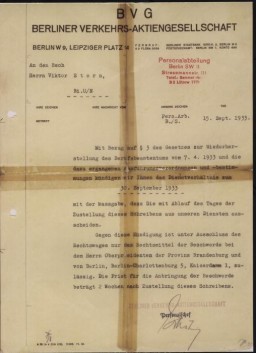
-
Szlamach Radoszynski
ID CardSzlamach was one of six children born to Yiddish-speaking, religious Jewish parents. Szlamach's father was a peddler, and the Radoszynski family lived in a modest apartment in Warsaw's Praga section on the east bank of the Vistula River. After completing his schooling at the age of 16, Szlamach apprenticed to become a furrier. 1933-39: During the 1930s Szlamach owned a fur business. Despite the Depression, he was hoping the economy would turn around so that he could make enough money to move into his own…
